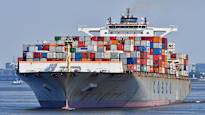The exports of Finland’s most important trading partner are now doing exceptionally poorly. Germany will need Finnish know-how in the future.
HAMBURG First the bad news: the exports of Germany, the largest economy in the euro area, contracted again in July.
Then ladies: There is a shortage in Germany right now of precisely the skills that the Finns have to offer.
Germany’s exports are shrinking mainly because, due to superpower disputes, there is less and less demand for the products manufactured by the country’s companies in the world. In particular, exports and imports with the largest trading partner, China, are falling.
As world trade disputes escalate, Germany’s trade with China is decreasing. Continents turn inward in trade.
Finns have an opportunity here, and many medium-sized companies have already noticed it.
Despite Germany’s poor economic situation, Finns’ enthusiasm to move to the Hanseatic city of Hamburg has increased recently, says a consultant who helps companies enter the German market Mari Kutila.
– In everyday life, we have seen that Finnish companies contact us more now, Kutila says.
The opportunity for Finns is that Germany is lagging behind in digitalization by a couple of decades. Faxes are widely used, telephone networks only work well in city centers, and remote reading of electricity meters in homes is just coming into its own.
There are also markets for Finnish companies here in the circular economy and cyber security.
– Digital and technology companies are really strong in Finland, and Finland is far ahead of Germany in these matters. That is where supply and demand meet between Finland and Germany, Kutila says.
The port of Hamburg is a bright spot
The Finnish light spot is Hamburg, Germany’s largest port. The port’s trade with Finland is growing. There are industries in the Hamburg region that Finns have something to offer, such as maritime and aviation and logistics companies.
– There are also more than 30 global giant companies in Hamburg. If you want to chain them, there are strong cards here.
China is by far the largest trading partner of the Port of Hamburg, but Finland rose to sixth place last year, overtaking, for example, Britain and India.
According to Kutila, Finns’ strength is quality. Companies need help because their language skills and sales skills are weak. The Finn sells too “passively”.
– Let’s assume that the other party understands and knows immediately how good the product is, but that’s not the case. You have to come to Germany with pride and tell more about the product than what would be told in the Finnish market.
The big cultural difference is that Germany is still clearly more hierarchical than Finland and the other Nordic countries.
– In Finland you can go directly to the CEO’s speeches, but in Germany you can’t.
Finnish companies are also often surprised by the slowness of transactions. This is influenced not only by the larger size of the German market, but also by historical factors. A German is more suspicious than a Finn.
– Germany is not a credit-based culture like Finland is. Things are questioned more, and people want to check them two, three or even four times.
